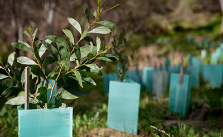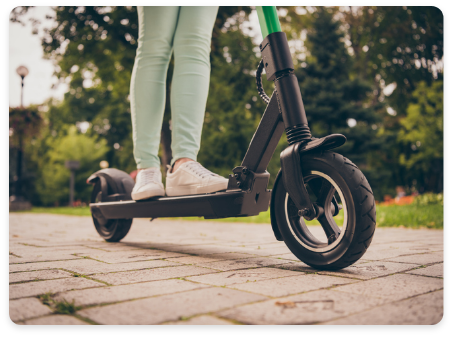Supporting the transition to a low carbon economy
Managing & reducing Esker’s environmental footprint

Esker’s carbon footprint
Esker is strongly committed to reducing the environmental footprint of our business activities. Beginning in 2018 in France, Esker has established processes for determining its carbon emissions, and has since extended these to all locations worldwide. The conclusions of the yearly energy performance reports enable us to find new ways to further reduce emissions.
Total CO2 emissions (2023):
9 256 t.CO2.e
SCOPE 1
266 t.CO2.e
SCOPE 2
426 t.CO2.e
SCOPE 3
8 565 t.CO2.e

ISO certification
Both Esker locations in France, Villeurbanne and Décines, have received the ISO 14001 certification, which creates a framework guiding our environmental performance and enables us to continuously reduce our carbon footprint.

Reforest'Action
Replanting a wide variety of tree species is one of the pillars of the strategy to remove carbon emissions from Earth’s atmosphere and protect biodiversity. With Esker’s support, Reforest’Action, a nonprofit organisation engaging in a unique approach they call “crowdplanting”, more than 29,250 trees have been planted in Peru, India, Haiti and Tanzania since 2019.
The ecological impact of digital technology
Data centres &
energy efficiencyTo reduce its environmental footprint, Esker chooses environmentally responsible vendors whenever possible. For example, all new Esker customers are hosted by default on Microsoft Azure, which uses energy from renewable resources for a significant portion of its data centres and bases its billing model on server resource usage, thereby encouraging moderation.
Responsible product
developmentEsker ensures that its R&D teams are attentive to the digital footprint of software operations by building optimised services and energy efficiency into its solutions. Esker also conducts regular internal conferences on the challenges of digital sobriety, led by the founder of GreenIT.fr.
Life cycle of IT
equipmentEsker strives to extend the lifecycle of company-owned IT equipment and electronic devices as much as possible, through in-house maintenance, vendor support, or employee buy-back programmes in exchange for donations to charities of their choosing.
The ecological impact of Esker solutions
Esker’s cloud automation solutions reduce paper and the use of IT hardware, thereby lowering CO₂ emissions.*
*Source: The carbon benefits of cloud computing: A study on the Microsoft Cloud in partnership with WSP. 2020. Microsoft.
Less paper
Less equipment
Less carbon

The circular economy
Raising awareness with internal workshops and providing appropriate recycling and waste sorting containers at all locations are just two of the ways Esker supports the push towards a zero-waste economy.
- Waste recycling at mail production facilities: 100% (France), 75% (USA)
- Workshops on reducing the carbon footprint
- Recycling containers at all locations
- 100% of Waste Electrical and Electronic Equipment (WEEE) is recycled
Mobility & business travel
To encourage the use of low-carbon modes of transport, Esker offers a variety of incentives: electric car fleets, bike and scooter parking, mileage reimbursement for bicycle use, and public transport compensation.
- 60% of vehicles in the company fleet are either electric or hybrid-electric
- 96% of employees make use of remote work options
- 53% of employees use low-carbon means of transport for their commute

Esker's commitments
Our partners
- Coming Soon